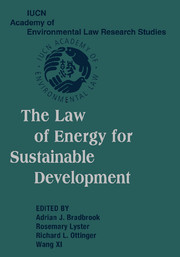Book contents
- Frontmatter
- Contents
- Acknowledgments
- Message from Kofi A. Annan, Secretary-General, United Nations
- Introduction – A Global Learned Society to Address Earth's Evolution: The IUCN Academy of Environmental Law
- Public Lectures on International Environmental Law
- PART ONE SUSTAINABLE DEVELOPMENT AND THE ROLE OF ENERGY LAW
- 1 Development and Energy
- 2 The Imperatives of Energy for Sustainable Development
- 3 2020 Energy Demand of China and Energy Conservation
- 4 Sustainable Development and the Marrakech Accords
- 5 Ethical Implications
- 6 Technological Implications
- PART TWO LEGAL ISSUES IN CONTEMPORARY ENERGY LAW
- PART THREE INTERNATIONAL ENERGY LAW
- PART FOUR COMPARATIVE ENERGY LAW
- PART FIVE ELECTRICITY RESTRUCTURING
- PART SIX FINANCING FOR SUSTAINABLE ENERGY
- PART SEVEN CIVIL SOCIETY AND THE PROCEDURAL REQUIREMENTS OF ENERGY LAW FOR SUSTAINABLE DEVELOPMENT
- Index
1 - Development and Energy
Published online by Cambridge University Press: 10 August 2009
- Frontmatter
- Contents
- Acknowledgments
- Message from Kofi A. Annan, Secretary-General, United Nations
- Introduction – A Global Learned Society to Address Earth's Evolution: The IUCN Academy of Environmental Law
- Public Lectures on International Environmental Law
- PART ONE SUSTAINABLE DEVELOPMENT AND THE ROLE OF ENERGY LAW
- 1 Development and Energy
- 2 The Imperatives of Energy for Sustainable Development
- 3 2020 Energy Demand of China and Energy Conservation
- 4 Sustainable Development and the Marrakech Accords
- 5 Ethical Implications
- 6 Technological Implications
- PART TWO LEGAL ISSUES IN CONTEMPORARY ENERGY LAW
- PART THREE INTERNATIONAL ENERGY LAW
- PART FOUR COMPARATIVE ENERGY LAW
- PART FIVE ELECTRICITY RESTRUCTURING
- PART SIX FINANCING FOR SUSTAINABLE ENERGY
- PART SEVEN CIVIL SOCIETY AND THE PROCEDURAL REQUIREMENTS OF ENERGY LAW FOR SUSTAINABLE DEVELOPMENT
- Index
Summary
INTRODUCTION
While energy is a physical entity well understood and quantitatively defined, the concept of development is less well defined and there are different perceptions about its meaning. The World Bank measures development by the gross national product (GNP) and nations are classified in categories according to their GNP per capita.
This monetization of the concept of development is not well understood, nor accepted by many, particularly in developing countries, where income per capita varies dramatically between the poor and the rich. This is not the case in the Organization for Economic Cooperation and Development (OECD) countries where there is a large middle class and variations in income are not very large.
What the poor in the developing countries aspire to – and they represent seventy percent of the world's population – is a “better life,” meaning jobs, food, health services, housing (rural or urban), education, transportation, running water, sewage communication services, security of supply, and good environment. These things are usually measured in industrialized countries by monetary transactions, but not necessarily so in many others. Climate, abundant and easily available natural resources can lead to a better life without great monetary expenses. In some countries cultural values are such that some items are less desirable than in others. In others the political system privileges some solutions over others that cost much less. This is why to compare stages of development only by GDP per capita can be quite misleading.
- Type
- Chapter
- Information
- The Law of Energy for Sustainable Development , pp. 37 - 45Publisher: Cambridge University PressPrint publication year: 2005



